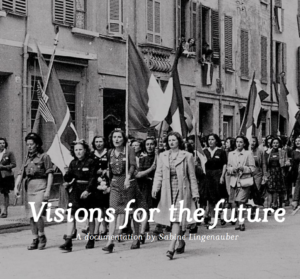Last month we reported on Eleonora Teszenyi’s attendance at a Sightlines conference seminar. We thought you would like to hear about another one this month so Jo Josephidou is going to discuss her response to the seminar ‘The Women and the Schools of Reggio Emilia’ presented by Professor Sabine Lingenauber and Janina L. von Niebelschütz.

Why did you choose this particular session?
This session seemed to encompass two key research interests of mine – gender and early years pedagogy. Malaguzzi has long been one of my educational heroes because I appreciate his view of children as competent and strong as illustrated in his moving and challenging poem ‘A hundred languages’. In addition to this, I have always been in awe of the fascinating work produced in the Reggio settings and in particular the children’s drawings. Although I was drawn to the session by an interest in Malaguzzi’s work, he was hardly mentioned at all in the seminar; instead the spotlight was shone on the courageous, determined and inspirational women who had played a vital role in establishing this world renowned educational provision for children. They had established this ground-breaking work in a country recovering from occupation, war and fascist ideology. I know this area of Italy quite well, having lived and worked there, yet there were some connections I had failed to make. This realisation made me reflect on the connections I may also fail to make in the context of ECEC provision in general with its highly gendered workforce. Suffice to say, I was blown away by the session, by its sense of energy, its casting of new light on familiar ideas and the status that it gave these strong women of Reggio Emilia.
What are the key points you have taken away?
I was reminded of the wider purposes of education; we become so fixed on accountability agendas within our own context such as: are the children achieving a good level of development, what progression are they making towards the Early Learning Goals, how are they getting on with phonics? Yet here was presented an education system that was a continuation of brave women’s struggle against fascism. Not only that, it was a continuation of their fight for equality with men. One of my favourite books, and one I return to often, is The activist teaching profession by Judyth Sachs (2003); here Sachs challenges us to think about our role in educating children in terms of ‘How to be, How to act and How to understand’ (p. 15). But what are the links between activism and quality early childhood experiences in the context of the United Kingdom, from which I write? How should we be, act and understand? One current example perhaps is the coming together of practitioners, consultants, parents and academics to contribute to Birth to Five Matters, a redrafting of the non-statutory guidance in England. This redrafting is a rejection of the DfE compiled document by those with a wealth of experience and understanding of how to engage with young children in care and educational contexts.
How will it impact on your future research and work?
Attending this session has opened my mind to other possibilities; it is a reminder to look at what is not said and who is not seen to be speaking. It is a reminder to look beyond the louder voices to the whispers in the background; this notion interests me when I consider the voice of Early Years practitioners in my own context where their voices are often said to be silenced (Brownhill and Oates, 2016). I have also begun to question my own assumptions and how I have been socialised into the discipline of Early Childhood; for example, a potential lack of criticality in my hero worship of Malaguzzi. As I pondered on this idea within the session, I had an opportunity to pose a question to Sabine Lingenauber; I asked, out of genuine curiosity, what had led her to consider this piece of research on the Women of Reggio. She explained how it had been a chance conversation, whilst visiting the city of Reggio Emilia with her students; she had encountered one of these woman, women she calls ‘witnesses’, who was now in her nineties. This chance conversation also made her question her assumptions about the Reggio approach and triggered this research interest.
Do take time to look at the beautifully presented website, which contains details of Lingenauber’s research, complete with videos and interviews; I hope you are as inspired as I have been!
